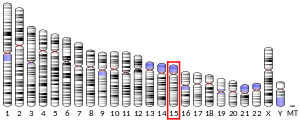Protein-coding gene in humans
Dyslexia susceptibility 1 candidate gene 1 protein is a protein that in humans is encoded by the DYX1C1 gene .[ 5] [ 6] tetratricopeptide repeat (TPR) domains, thought to mediate protein–protein interactions.
Clinical significance
A mutation in the DYX1C1 gene has been associated with deficits in reading ability (dyslexia ).[ 5] [ 7]
References
^ a b c GRCh38: Ensembl release 89: ENSG00000256061 – Ensembl , May 2017^ a b c GRCm38: Ensembl release 89: ENSMUSG00000092192 – Ensembl , May 2017^ "Human PubMed Reference:" . National Center for Biotechnology Information, U.S. National Library of Medicine .^ "Mouse PubMed Reference:" . National Center for Biotechnology Information, U.S. National Library of Medicine .^ a b Taipale M, Kaminen N, Nopola-Hemmi J, Haltia T, Myllyluoma B, Lyytinen H, Muller K, Kaaranen M, Lindsberg PJ, Hannula-Jouppi K, Kere J (Oct 2003). "A candidate gene for developmental dyslexia encodes a nuclear tetratricopeptide repeat domain protein dynamically regulated in brain" . Proc Natl Acad Sci U S A . 100 (20): 11553– 8. doi :10.1073/pnas.1833911100 PMC 208796 PMID 12954984 . ^ "Entrez Gene: DYX1C1 dyslexia susceptibility 1 candidate 1" .^ Bates TC, Lind PA, Luciano M, Montgomery GW, Martin NG, Wright MJ (November 2009). "Dyslexia and DYX1C1: deficits in reading and spelling associated with a missense mutation" . Mol. Psychiatry . 15 (12): 1190– 6. doi :10.1038/mp.2009.120 PMID 19901951 .
Further reading
Bates TC, Lind PA, Luciano M, Montgomery GW, Martin NG, Wright MJ (November 2009). "Dyslexia and DYX1C1: deficits in reading and spelling associated with a missense mutation" . Mol. Psychiatry . 15 (12): 1190– 6. doi :10.1038/mp.2009.120 PMID 19901951 . Bonaldo MF, Lennon G, Soares MB (1997). "Normalization and subtraction: two approaches to facilitate gene discovery" . Genome Res . 6 (9): 791– 806. doi :10.1101/gr.6.9.791 PMID 8889548 . Brkanac Z, Chapman NH, Matsushita MM, et al. (2007). "Evaluation of candidate genes for DYX1 and DYX2 in families with dyslexia". Am. J. Med. Genet. B Neuropsychiatr. Genet . 144 (4): 556– 60. doi :10.1002/ajmg.b.30471 . PMID 17450541 . S2CID 43864328 . Cope NA, Hill G, van den Bree M, et al. (2005). "No support for association between dyslexia susceptibility 1 candidate 1 and developmental dyslexia". Mol. Psychiatry . 10 (3): 237– 8. doi :10.1038/sj.mp.4001596 . PMID 15477871 . S2CID 1777791 . Gerhard DS, Wagner L, Feingold EA, et al. (2004). "The status, quality, and expansion of the NIH full-length cDNA project: the Mammalian Gene Collection (MGC)" . Genome Res . 14 (10B): 2121– 7. doi :10.1101/gr.2596504 . PMC 528928 PMID 15489334 . Marino C, Citterio A, Giorda R, et al. (2007). "Association of short-term memory with a variant within DYX1C1 in developmental dyslexia" . Genes, Brain and Behavior 6 (7): 640– 6. doi :10.1111/j.1601-183X.2006.00291.x PMID 17309662 . Ota T, Suzuki Y, Nishikawa T, et al. (2004). "Complete sequencing and characterization of 21,243 full-length human cDNAs" . Nat. Genet . 36 (1): 40– 5. doi :10.1038/ng1285 PMID 14702039 . Scerri TS, Fisher SE, Francks C, et al. (2005). "Putative functional alleles of DYX1C1 are not associated with dyslexia susceptibility in a large sample of sibling pairs from the UK" . J. Med. Genet . 41 (11): 853– 7. doi :10.1136/jmg.2004.018341 . PMC 1735619 PMID 15520411 . Strausberg RL, Feingold EA, Grouse LH, et al. (2003). "Generation and initial analysis of more than 15,000 full-length human and mouse cDNA sequences" . Proc. Natl. Acad. Sci. U.S.A . 99 (26): 16899– 903. Bibcode :2002PNAS...9916899M . doi :10.1073/pnas.242603899 PMC 139241 PMID 12477932 . Wigg KG, Couto JM, Feng Y, et al. (2005). "Support for EKN1 as the susceptibility locus for dyslexia on 15q21" . Mol. Psychiatry . 9 (12): 1111– 21. doi :10.1038/sj.mp.4001543 PMID 15249932 . Ylisaukko-Oja T, Peyrard-Janvid M, Lindgren CM, et al. (2005). "Family-based association study of DYX1C1 variants in autism" . Eur. J. Hum. Genet . 13 (1): 127– 30. doi :10.1038/sj.ejhg.5201272 PMID 15470369 .



